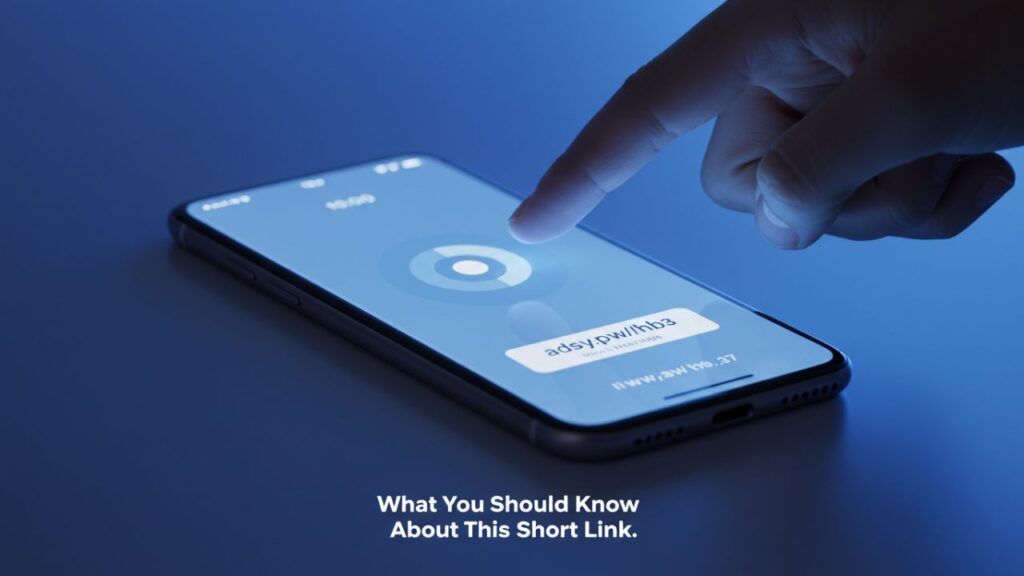In the world of digital content, links like adsy.pw/hb3 are becoming increasingly common. These shortened URLs are often used in social media posts, ads, emails, and online campaigns. But what exactly does adsy.pw/hb3 link to? Is it safe? Who is behind it, and how should users respond when they see it?
This guide will break down what adsy.pw/hb3 is, how link shorteners work, potential risks, and how to stay safe while browsing shortened links. In an age where security and trust online are more important than ever, understanding links like adsy.pw/hb3 can help protect your personal information and improve your browsing habits.
adsy.pw/hb3: What Is It?
At its core, adsy.pw/hb3 is a shortened URL—a web link that redirects you to a longer destination URL. The domain “adsy.pw” is part of a link shortening service, and “/hb3” is a custom path that leads to a specific page or resource.
Short links like this are used for:
-
Tracking user clicks
-
Shortening long URLs for social media or emails
-
Redirecting to landing pages or promotions
-
Disguising the full destination URL
While there are legitimate uses for such links, they can also be misused for spam, phishing, or malware delivery. That’s why understanding how to handle a link like adsy.pw/hb3 matters.
How Link Shorteners Like adsy.pw Work
Link shorteners have become a core part of digital marketing and communication strategies. Services like adsy.pw are designed to:
-
Generate a short version of a long, complex URL.
-
Track engagement, including who clicks, from where, and when.
-
Route users to a landing page, offer, file download, or external site.
-
Mask URLs to keep messages clean, especially in character-limited platforms like Twitter or messaging apps.
While services like Bitly, TinyURL, and Rebrandly are better known, adsy.pw operates similarly, but with less transparency and public brand awareness.
Who Uses adsy.pw/hb3 and Why?
Links like adsy.pw/hb3 may appear in:
-
Online advertisements
-
Email campaigns
-
Social media promotions
-
Paid traffic redirection systems
-
Affiliate marketing links
The goal is often to measure performance—for example, tracking how many people clicked a link in an Instagram story or ad. However, because it’s not clear at first glance where the link leads, some users are understandably cautious.
If you’ve encountered the adsy.pw/hb3 link unexpectedly, such as in a DM, pop-up, or suspicious email, it’s wise to verify the link before clicking.
Is adsy.pw/hb3 Safe?
This is the biggest question people have—and the answer depends entirely on how the link is being used.
Potential Safe Use Cases
-
Affiliate tracking for a product or service.
-
Shortened redirect from a legitimate marketer or business.
-
Part of a campaign with proper disclosures.
Potential Risky Scenarios
-
Phishing attempts where the link disguises a fake login page.
-
Malware downloads that start when the link is clicked.
-
Redirect loops that bombard the user with pop-ups or spam.
The main risk with shortened URLs is the lack of visibility. Unlike standard links, users can’t tell where they’re going before clicking—making them ideal for both marketers and scammers alike.
How to Check a Shortened Link Like adsy.pw/hb3
Before clicking on adsy.pw/hb3 (or any unfamiliar short link), consider these steps:
1. Use a Link Unshortening Tool
Sites like CheckShortURL or Unshorten.It allow you to paste a short link and reveal the full destination. Simply copy adsy.pw/hb3 into one of these tools.
2. Preview in Incognito Mode
Open a private browser window to test the link without cookies or saved data.
3. Scan with a Link Scanner
Use tools like VirusTotal or Google Safe Browsing to scan the link for malware or phishing activity.
4. Watch for HTTPS
If the redirected site lacks HTTPS encryption, that’s a major red flag. Always ensure the destination site is secure.
5. Avoid Clicking If Suspicious
If the link was sent unsolicited or comes with odd grammar or urgency (like “click now or lose access”), it’s safer to skip.
Why adsy.pw/hb3 May Appear in Your Browser or Inbox
Here are common ways users come across this link:
-
Embedded in advertisements from affiliate networks.
-
Included in email newsletters or marketing blasts.
-
Shared through social media DMs or posts.
-
Pop-ups or redirects from low-quality websites.
If you’re repeatedly seeing adsy.pw/hb3 without initiating the search, it may suggest a browser hijacker, rogue extension, or adware.
What to Do If You Clicked adsy.pw/hb3
If you already clicked the link and aren’t sure about its safety:
-
Check browser activity: Review your history and see where you were redirected.
-
Run antivirus software: Make sure your system hasn’t been compromised.
-
Clear browser cache: This can help remove tracking cookies or adware-related code.
-
Update passwords: If the link led to a login page and you entered information, change your credentials immediately.
-
Report the link: If it’s malicious, you can report it to Google Safe Browsing or your local internet authority.
How to Block Future Links Like adsy.pw/hb3
If you want to stop seeing such links or prevent accidental clicks, here are some steps you can take:
-
Use an ad blocker like uBlock Origin or AdGuard to stop unwanted pop-ups.
-
Install anti-tracking extensions like Privacy Badger or Ghostery.
-
Avoid suspicious websites that serve third-party, redirect-heavy ads.
-
Regularly audit browser extensions to remove anything unnecessary or suspicious.
Are All Shortened Links Bad?
Not at all. Many trusted companies use link shorteners daily. The issue lies in how the link is created and used.
Legitimate use examples:
-
Twitter shortened links
-
YouTube affiliate URLs
-
Email newsletters with tracking metrics
-
Campaign-specific short URLs
The problem begins when link shorteners are used to hide intent, disguise malware, or harvest data. As a best practice, never click on short links from unknown sources unless verified.
What Can Businesses Learn from adsy.pw/hb3?
For marketers, the rise in caution around links like adsy.pw/hb3 is a reminder: transparency builds trust.
-
Always label your links with clear context (“Check out our summer guide here!”).
-
Use branded shorteners like Bit.ly with custom slugs.
-
Avoid overwhelming users with pop-ups or redirects.
-
Include a visible preview of where the link leads.
Alternatives to adsy.pw for Safer Link Shortening
If you’re considering using short links in your campaigns, here are safer, more trusted alternatives:
-
Bitly.com – Offers custom short links, analytics, and branded domains.
-
TinyURL.com – Long-standing short link service with preview options.
-
Rebrandly.com – Good for businesses wanting to control their domain and link identity.
-
Short.io – Advanced tracking with custom domains.
Avoid lesser-known services with no transparency, customer support, or abuse reporting tools.
Conclusion
The adsy.pw/hb3 link is a prime example of how short URLs have both power and risk in today’s digital world. While such links can be useful for marketing and convenience, they also raise concerns about trust, security, and intent.
By understanding how adsy.pw/hb3 and similar links function, internet users can better protect themselves from phishing, malware, and unwanted tracking. Always preview or verify unfamiliar links, especially when received in messages, emails, or pop-ups.
As the web continues to evolve, so should our habits. Staying informed and cautious can go a long way in navigating short links safely and confidently.






